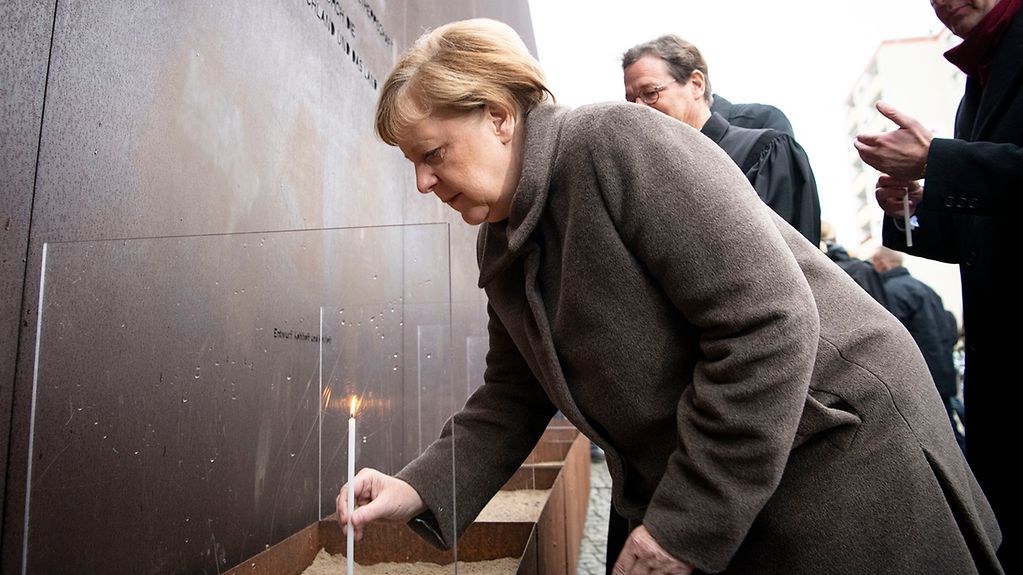30th anniversary of the fall of the Berlin Wall
On the 30th anniversary of the fall of the Berlin Wall, Chancellor Angela Merkel paid tribute to the victims of the division of Germany. At the Berlin Wall Memorial, she lit a candle in memory of the divided city and the victims of communist tyranny. "Too many people were victims of the East German SED dictatorship. We shall not forget them," said the Chancellor.
4 min reading time

A candle for the victims of the Berlin Wall - Chancellor Angela Merkel during the commemorative event at Berlin's Bernauer Straße.
Photo: Bundesregierung
In the Chapel of Reconciliation, at Berlin’s Bernauer Straße, Chancellor Angela Merkel paid tribute to the victims of the division of Germany. "No wall that keeps people apart and restricts their freedom is so tall or so wide that it cannot be breached," said the Chancellor.
"Act of contempt"
After the Berlin Wall was erected in 1961, the Chapel of Reconciliation found itself in no man’s land, inaccessible from either the East or the West of the divided city of Berlin. In 1985 it was demolished by East Germany. "That was nothing other than an act of contempt, because the church stood in the way of a free line of fire," declared the Chancellor. The demolition demonstrated the "irreconcilability" of the East German dictatorship with the basic needs of individuals to exercise their human rights and their civil rights and liberties. "Too many people were victims of the East German SED regime. We shall not forget them."
9 November – a fateful day for Germany
In her address in the Chapel of Reconciliation, the Chancellor stressed that 9 November is a "fateful day in German history". "Today we also remember the victims of the November pogrom in 1938. We remember the crimes committed against Jewish people in Germany during the night from 9 to 10 November 1938," declared the Chancellor. "9 November, a day which reflects in a unique way both the worst and the happiest moments in our history, reminds us how important it is to stand up against hatred, racism and anti-Semitism."
Earlier in the day the Chancellor attended a commemorative event hosted by the Berlin Wall Foundation at the Memorial in Berlin’s Bernauer Straße, with the Federal President Frank-Walter Steinmeier and the heads of state of the four Visegrád states (Poland, the Slovak Republic, the Czech Republic and Hungary).
Celebrations at the Brandenburg Gate
In the evening the Chancellor attended the celebrations at the Brandenburg Gate. The Federal President spoke at the event. People from all over the world celebrated the fall of the Berlin Wall with music and live performances.
A lot has improved
Since the Berlin Wall fell, a lot has changed for the better. The disastrous environmental damage that was the legacy of the SED regime in East Germany has been redressed thanks to the joint efforts of federal, state and local governments – and with the financial support of the European Union.
By 2018 the economic strength of the east of Germany had risen to 75 per cent of the level of the west – in 1990 the figure was only 43 per cent. Wages and income too have risen in recent years.
The labour market in the east of the country has shown increasingly positive trends over the last few years. As compared with the peak of 18.7 per cent unemployment in 2005, unemployment in the east today is 12 percentage points down (to 6.4 per cent in August 2019).
The mood in the east of the country
"I know that for East Germans of a certain generation, the peaceful revolution did bring freedom, but did not necessarily make life easier. I also know that alongside successful regions there are others where the villages are emptying as children and grandchildren move away. Nevertheless, today, thirty years later we must say quite clearly that even if people are dissatisfied with local public transport, medical care, the actions of government as a whole, or with their own lives, this does not give them the right to demonstrate hatred or contempt towards other people, far less to resort to violence. There can be no tolerance of this sort of behaviour," said Chancellor Angela Merkel recently in an interview with Spiegel Online.
For the German government, the mood in the east of the country demonstrates that the process of reunification still poses huge challenges for Germany as a whole. The Cabinet committee on the "new federal states" which met in September, has thus identified twelve fields of action. They cover a spectrum from coming together to commemorate the fall of the Berlin Wall and German reunification to establishing comparable living conditions and integrating migrants.
"I encourage everyone to express their own opinions, but you have to be prepared for others to question these … that is part of democracy," said the Chancellor.
Comparable living conditions
To ensure comparable living conditions the German government adopted a whole series of measures in July. Structurally weak regions across the country are to be strengthened with the help of a nationwide promotion scheme. Important goals include nationwide mobile coverage and broadband as well as good healthcare coverage and good transport links in rural areas, which are particularly affected by the aging population.